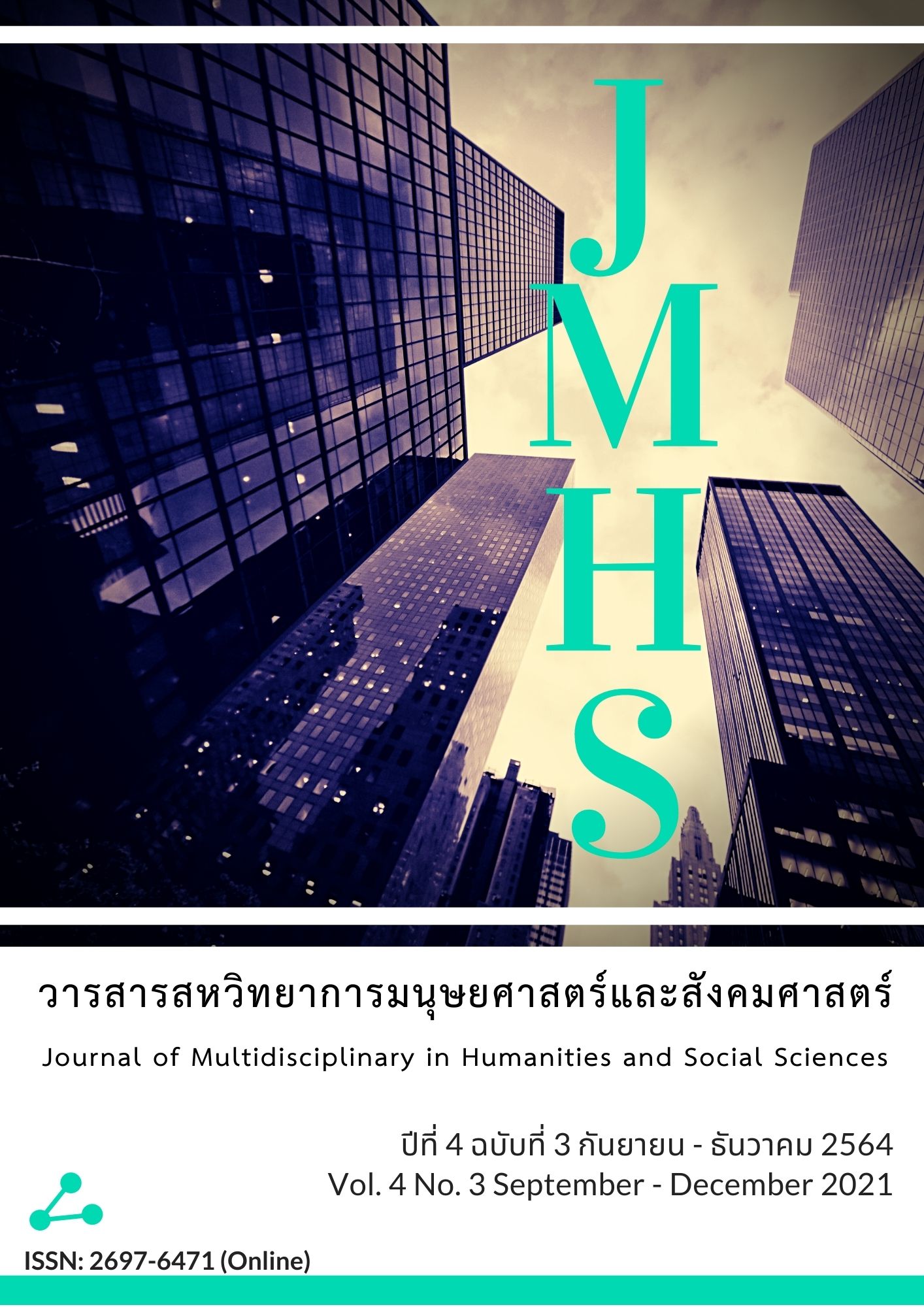Good Governance for School Administrators within the Thammajak Consortium Operating under the Secondary Educational Service Area Office 5
Main Article Content
Abstract
This article aimed to study (1) good governance for school administrators; and (2) good governance guidelines for school administrators. The sample was 165 government teachers in the Thammajak Consortium operating under the Secondary Educational Service Area Office 5. They were selected by stratified random sampling. The instrument for collecting data was a questionnaire and structured interview. Analysis data by descriptive statistics and Content Analysis. The research results were found as follows:
1. Good governance for school administrators within the Thammajak Consortium Operating under the Secondary Educational Service Area Office 5 was almost at a high level. Regarding a particular, each area was at a high level.
2. Good governance guidelines for school administrators were: 1) The school administrators should save working time and reduce the process; 2) The school administrators should explore the opinions of stakeholders; 3) The school administrators should classify a group of clients to determine strategies to reach; 4) The school administrators should analyze potential problems and develop a plan for preventive action; 5) The school administrators should develop an efficient publishing system; 6) The school administrators should encourage teachers to develop themselves; 7) The school administrators should serve equal services practice; 8) The school administrators should promote stakeholders for better education management; 9) The school administrators should coordinate with external agencies to develop an educational system; and 10) The school administrators should be polite.
The findings from this research are used as guidelines for the development of the use of good governance by educational institution administrators to facilitate the smooth operation of educational institutions resulting in quality education management.
Article Details
Views and opinions appearing in the Journal it is the responsibility of the author of the article, and does not constitute the view and responsibility of the editorial team.
References
กัลยาณี สีลารักษ์ และพิมลพรรณ เพชรสมบัติ. (2563). หลักธรรมาภิบาลของผู้บริหารสถานศึกษาสังกัดสำนักงานเขตพื้นที่การศึกษามัธยมศึกษา เขต 28. วารสาร มจร. พุทธปัญญาปริทรรศน์, 5(3), 53-67.
ฉัตรมงคล สูงเนิน. (2561). แนวทางการบริหารงานตามหลักธรรมาภิบาลของผู้บริหารสถานศึกษาในจังหวัดนครสวรรค์ สังกัดสำนักงานเขตพื้นที่การศึกษามัธยมศึกษา เขต 42(วิทยานิพนธ์ครุศาสตรมหาบัณฑิต). มหาวิทยาลัยราชภัฏนครสวรรค์.
ถวิลวดี บุรีกุล. (2561). หลักธรรมาภิบาลจากแนวคิดสู่การปฏิบัติในสังคมไทย. กรุงเทพฯ: สถาบันพระปกเกล้า.
นณรฎ พิศลยบุตร. (2558). ความเหลื่อมล้ำทางการศึกษาของไทย: ข้อสรุปจากผลการสอบปิซ่า (PISA). กรุงเทพฯ: สถาบันวิจัยแห่งประเทศไทย.
เปรมมิกา อ่อนธานี. (2559). แนวทางการบริหารตามหลักธรรมาภิบาลของผู้บริหารสถานศึกษาโรงเรียนขยายโอกาสทางการศึกษา สังกัดสำนักงานเขตพื้นที่การศึกษาประถมศึกษาอุทัยธานี เขต 2(วิทยานิพนธ์ครุศาสตรมหาบัณฑิต). มหาวิทยาลัยราชภัฏนครสวรรค์.
พระสมุห์วิศักดิ์ อิทฺธิญาโณ (กอจันทร์). (2558). การบริหารสถานศึกษาตามหลักธรรมาภิบาลวิถีพุทธ. วารสารครุศาสตร์ปริทรรศน์ฯ, 2(3), 87-96.
พิษณุ ยงดี และศักดิพันธ์ ตันวิมลรัตน์. (2560). ธรรมาภิบาลของโรงเรียนรัตนราษฎร์บำรุง. วารสารการบริหารการศึกษา มหาวิทยาลัยศิลปากร, 7(2), 161-171.
วิภาส ทองสุทธิ์ และวิวัฒน์ ตู้จำนงค์. (2564). การบริหารงานตามหลักธรรมาภิบาลของผู้บริหารโรงเรียนสังกัดสำนักงานเขตพื้นที่การศึกษามัธยมศึกษา เขต 31 กรณีศึกษาโรงเรียนภู่วิทยา จังหวัดนครราชสีมา. วารสารวิชาการ มหาวิทยาลัยนอร์ทกรุงเทพ, 10(1), 155-164.
วิไลรัตน์ ฝ่ายดี. (2559). การบริหารงานตามหลักธรรมาภิบาลของผู้บริหารโรงเรียนขนาดกลางในอำเภอตาพระยา สังกัดสำนักงานเขตพื้นที่การศึกษาประถมศึกษาสระแก้ว เขต 2(วิทยานิพนธ์ศึกษาศาสตรมหาบัณฑิต). มหาวิทยาลัยบูรพา.
สถาบันวิจัยเพื่อการพัฒนาประเทศไทย. (2559). แนวทางการพัฒนาธรรมาภิบาลในระยะแผนพัฒนาเศรษฐกิจและสังคมแห่งชาติ ฉบับที่ 12 พ.ศ. 2560-2564 และการขับเคลื่อนธรรมาภิบาลของประเทศไทยสู่การปฏิบัติอย่างเป็นรูปธรรม. กรุงเทพฯ: มูลนิธิสถาบันวิจัยเพื่อการพัฒนาประเทศไทย.
สาคร มหาหิงคุ์. (2560). การบริหารงานตามหลักธรรมาภิบาลของสถานศึกษาขั้นพื้นฐาน สังกัดสำนักงานเขตพื้นที่การศึกษาประถมศึกษาขอนแก่น เขต 4. วารสารวิชาการวิทยาลัยสันตพล, 3(1), 12-19.
สำนักงานคณะกรรมการพัฒนาการเศรษฐกิจและสังคมแห่งชาติ. (2562). แผนพัฒนาเศรษฐกิจและสังคมแห่งชาติ ฉบับที่ 12 พ.ศ. 2560 – 2564. สืบค้นเมื่อ 9 พฤษภาคม 2562, จาก http://www.nesdb.go.th/ewt_dl_link.php?nid=6422
สำนักงานคณะกรรมการพัฒนาระบบราชการ (ก.พ.ร.). (2552). คู่มือการจัดระดับการกำกับดูแลองค์การภาครัฐตามหลักธรรมาภิบาลของการบริหารกิจการบ้านเมืองที่ดี (Good Governance Rating). กรุงเทพฯ: พรีเมียร์ โปร.
สำนักงานคณะกรรมการพัฒนาระบบราชการ (ก.พ.ร.). (2555). หลักธรรมาภิบาลของการบริหารกิจการบ้านเมืองที่ดี. กรุงเทพฯ: สำนักพิมพ์คณะรัฐมนตรีและราชกิจจานุเบกษา.
Best, W. (1970). Research in Education. New Jersey: Prentice-Hall Inc.
Cronbach, J. (1974). Essentials of Psychological Testing. New York: Harper & Row Publisher.
Krejcie, V., & Morgan, W. (1970). Determining Sample Size for Research Activities. Educational and Psychological Measurement. 30, 607-610.
Likert, R. (1961). New Patterns of Management. New York: McGraw Hill.
Lunenburg, C., & Ornstein, C. (2012). Educational Administration; Concepts and Practices. (6th ed.). CA: Wadsworth.


